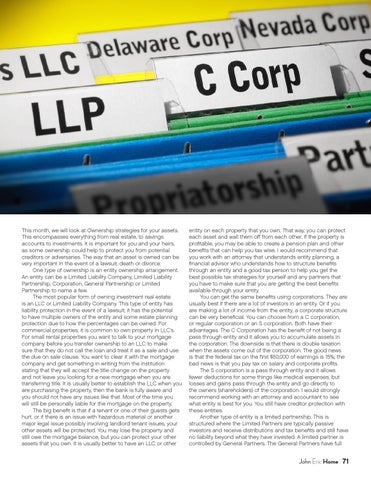This month, we will look at Ownership strategies for your assets. This encompasses everything from real estate, to savings accounts to investments. It is important for you and your heirs, as some ownership could help to protect you from potential creditors or adversaries. The way that an asset is owned can be very important in the event of a lawsuit, death or divorce. One type of ownership is an entity ownership arrangement. An entity can be a Limited Liability Company, Limited Liability Partnership, Corporation, General Partnership or Limited Partnership to name a few. The most popular form of owning investment real estate is an LLC or Limited Liability Company. This type of entity has liability protection in the event of a lawsuit; it has the potential to have multiple owners of the entity and some estate planning protection due to how the percentages can be owned. For commercial properties, it is common to own property in LLC’s. For small rental properties you want to talk to your mortgage company before you transfer ownership to an LLC to make sure that they do not call the loan and treat it as a sale and use the due on sale clause. You want to clear it with the mortgage company and get something in writing from the institution stating that they will accept the title change on the property and not leave you looking for a new mortgage when you are transferring title. It is usually better to establish the LLC when you are purchasing the property, then the bank is fully aware and you should not have any issues like that. Most of the time you will still be personally liable for the mortgage on the property. The big benefit is that if a tenant or one of their guests gets hurt, or if there is an issue with hazardous material or another major legal issue possibly involving landlord tenant issues, your other assets will be protected. You may lose the property and still owe the mortgage balance, but you can protect your other assets that you own. It is usually better to have an LLC or other
entity on each property that you own. That way, you can protect each asset and wall them off from each other. If the property is profitable, you may be able to create a pension plan and other benefits that can help you tax wise. I would recommend that you work with an attorney that understands entity planning, a financial advisor who understands how to structure benefits through an entity and a good tax person to help you get the best possible tax strategies for yourself and any partners that you have to make sure that you are getting the best benefits available through your entity. You can get the same benefits using corporations. They are usually best if there are a lot of investors in an entity. Or if you are making a lot of income from the entity, a corporate structure can be very beneficial. You can choose from a C corporation, or regular corporation or an S corporation. Both have their advantages. The C Corporation has the benefit of not being a pass through entity and it allows you to accumulate assets in the corporation. The downside is that there is double taxation when the assets come out of the corporation. The good news is that the federal tax on the first $50,000 of earnings is 15%; the bad news is that you pay tax on salary and corporate profits. The S corporation is a pass through entity and it allows fewer deductions for some things like medical expenses, but losses and gains pass through the entity and go directly to the owners (shareholders) of the corporation. I would strongly recommend working with an attorney and accountant to see what entity is best for you. You still have creditor protection with these entities. Another type of entity is a limited partnership. This is structured where the Limited Partners are typically passive investors and receive distributions and tax benefits and still have no liability beyond what they have invested. A limited partner is controlled by General Partners. The General Partners have full
John Eric Home 71
